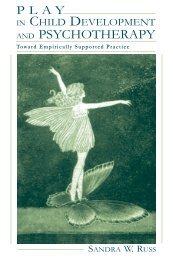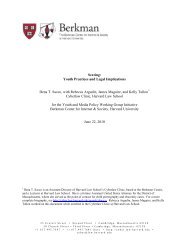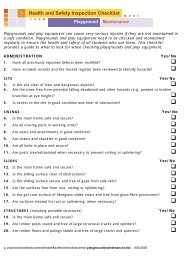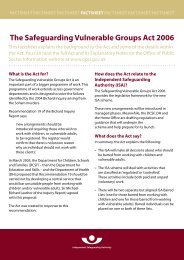Download PDF - Fair Play For Children
Download PDF - Fair Play For Children
Download PDF - Fair Play For Children
You also want an ePaper? Increase the reach of your titles
YUMPU automatically turns print PDFs into web optimized ePapers that Google loves.
Chapter 1:<br />
What children and families have told<br />
us and what the evidence says<br />
Introduction<br />
1.1<br />
This chapter summarises recent research and statistics on the experiences of children in play,<br />
looking at the benefits of play, activities children are currently undertaking, and barriers<br />
preventing children from playing.<br />
Definition of play<br />
1.2<br />
1.3<br />
We use ‘play’ in this document to describe what children and young people do when they<br />
follow their own ideas and interests in their own way and for their own reasons, balancing fun<br />
with a sense of respect for themselves and others. We asked children what play meant to them,<br />
and they talked about activities inside and outside of the home, including football, playing on<br />
equipment at the park, playing on computers or the internet, watching TV, board games, and<br />
baking cakes.<br />
This consultation is focused on outdoor play – when we asked children about this, they talked<br />
about football, playing in the garden, going to the park, playing in cul-de-sacs, nature walks,<br />
walking their dog, getting muddy in streams, hide and seek, riding bikes, and looking for buried<br />
treasure 9 .<br />
Benefits of play<br />
“It makes me feel free and happy.” (Girl, 10 9 )<br />
“You can get away from adults and decide what you want to do.” (Boy, 10 9 )<br />
“It can help you learn about how not to hurt yourself.” (Girl, 11 9 )<br />
1.4<br />
1.5<br />
We know that children enjoy playing. Research for <strong>Play</strong>day 2006 showed that 80 per cent of<br />
children surveyed preferred to play outside ii . In a separate survey 86 per cent of parents agreed<br />
that ‘on a nice day their children would prefer to go to the park than watch TV’ iii .<br />
The evidence clearly shows the importance of play in the emotional development of children.<br />
<strong>Play</strong>ing allows children to develop a sense of well-being iv , develops their emotional responses v ,<br />
and improves their interpersonal skills vi . It involves exploration and creativity vii , helping children<br />
9 Plain English Research on <strong>Play</strong>, Sherbert Research for DCSF and COI, 2008<br />
<strong>Fair</strong> <strong>Play</strong>: A consultation on the play strategy<br />
9





![The Childcare Act 2006 - Notes [Website] - Fair Play For Children](https://img.yumpu.com/50144819/1/184x260/the-childcare-act-2006-notes-website-fair-play-for-children.jpg?quality=85)

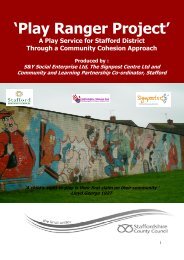


![Bouncy Castles [PDF] - Fair Play For Children](https://img.yumpu.com/45463572/1/184x260/bouncy-castles-pdf-fair-play-for-children.jpg?quality=85)

